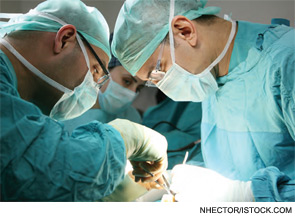Are surgical outcomes better for intraoral removal of proximal submandibular stones or traditional submandibular gland (SMG) resection? Background: Salivary stones, the most common cause of salivary ductal obstruction, usually occur in […]
Injection Laryngoplasty Helps in Recovery of Vocal Fold Motion
What are the long-term outcomes of patients with unilateral vocal fold paralysis (UVFP) who are treated with injection laryngoplasty (IL)? Background: IL, a temporary intervention for UVFP, is often performed in […]
Diagnosis of Supraglottitis in the Post-Immunization Era
What are the demographics, presentation, interventions and outcomes of acute supraglottitis in the era following widespread immunization against Haemophilus influenza type b? Background: The overall incidence of acute supraglottitis has decreased […]
Mandible Vascularized Bone Graft Reconstruction Successful in BRONJ
Does vascularized bone reconstruction provide optimum reconstruction among patients with bisphosphonate-related osteonecrosis of the jaw (BRONJ)? Background: Bisphosphonates, a commonly prescribed class of medications used in the treatment of multiple myeloma […]
Dysphagia May Lengthen Hospital Stay
Does the presence of dysphagia in hospitalized patients result in prolonged hospital stay and increased morbidity? Background: Dysphagia is a symptom that may be an indication of swallowing dysfunction. Swallowing dysfunction […]
Scoring System for Esophageal Cancer Requires Other Considerations
Can a simple scoring system identify individuals at high risk of esophageal cancer?1 Background: The prevalence of esophageal cancer is rapidly expanding. The prognosis for late stage esophageal cancer is dismal, […]
Old Problem, New Focus: Otolaryngologists tailor allergy treatments to geriatric patients
Allergic rhinitis among the elderly poses a particularly difficult diagnostic challenge for the otolaryngologist. As people age, they undergo immunosenescence. The thymus, which produces T cells against new invaders, atrophies markedly after adolescence, and this decline results in a less robust immune response to bacteria, viruses and presumably allergens (J Pathol. 2007;211(2):144-156). Consequently, physicians have assumed that allergies should decline as people age.
ENT Today Welcomes New Committee
One of the features weíve added to ENT Today since our new publishing partnership with Wiley-Blackwell has been concise, to-the-point reviews of some of the most important articles in the literature. Our editorial board members have been responsible for the most recent reviews in our ìLiterature Reviewî department, but the Triological Society has established a new committee of outstanding individuals who will scan the literature and write the summaries you read in ENT Today.

New Quality Indicator: MOC promotes better care, ABOto director says
With greater scrutiny of doctors and easier access to information about doctors’ education, the American Board of Otolaryngology’s Maintenance of Certification (MOC) program is more important than ever, said Robert Miller, MD, executive director of the American Board of Otolaryngology (ABOto).

A Tailored Approach to Dizziness: Take extra caution and care in the elderly, panelists say
Dizziness is a particular danger among the elderly, but extra care taken by physicians can help ease their problems and help keep older patients functioning, panelists said at the 2010 Annual Meeting of the American Academy of Otolaryngology-Head and Neck Surgery, held here Sept. 26-29.
- « Previous Page
- 1
- …
- 271
- 272
- 273
- 274
- 275
- …
- 328
- Next Page »